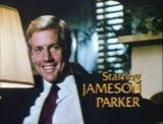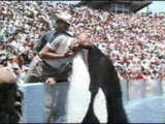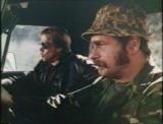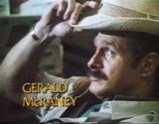|
LOS ANGELES (Zap2it.com) All this season on HBO's Western drama "Deadwood," the very mention of the name George Hearst has caused such formidable operators as saloonkeepers Cy Tolliver and Al Swearengen (Powers Boothe, Ian McShane) -- both of whom are more than willing to commit or solicit murder if it suits their purposes -- and less impressive locals, such as cringing hotelier E.B. Farnum (William Sanderson), to stutter, capitulate and bend over backwards to avoid giving offense to the 19th-century mining magnate.
On Sunday, May 22, in the show's second-season finale, called "Boy-the-Earth-Talks-To" (the name Hearst said American Indians gave him, referring to his skill at finding "color," or precious metals, underground), both the citizens of Deadwood and viewers will get to see what all the fuss is about, when Hearst finally arrives in the freewheeling late-1870s mining camp in the Black Hills of South Dakota.
Bringing Hearst to life is veteran character actor Gerald McRaney, a longtime acquaintance of legendary Paramount producer A.C. Lyles, a consulting producer on "Deadwood," created by David Milch ("NYPD Blue").
"At that moment in time," McRaney says, "there were people who believed that if God didn't destroy Deadwood, he owed Sodom and Gomorrah an apology. It was, in fact, beyond the law, and thus beyond the pale."
Hearst is eager to buy up all the gold mines in Deadwood, and he isn't too concerned about who he has to walk over to do it.
"George Hearst was a fascinating character," McRaney says. "But I don't think he was actually mean to people as some think he was. He just used them as any other piece of mining equipment.
"He was just so fixated on getting this stuff out of the ground, and it wasn't even for the wealth involved. For all I know the earth did talk to him."
Any man who could strike fear into the hearts of the lawless founders of Deadwood must be 10 feet tall and be able to catch lighting bolts in his teeth. Asked how he could play Hearst to live up to his billing, McRaney says, "Actually, I don't mind if people think [he should be taller], because people probably did think such things when this guy finally showed up.
"I'm just playing Hearst as a human being who has this one obsession that is in control of his life. At least his obsession isn't quite as deadly immediately as the one his assistant has."
Hearst's front man in Deadwood this season has been his geologist, Francis Wolcott, played by Garret Dillahunt. Earlier in the season, Wolcott slit the throats of two prostitutes and their madam, but murder in is nothing new to Dillahunt. Last season, under heavy makeup, Dillahunt played Jack McCall, the gambler who killed Wild Bill Hickock (Keith Carradine).
"He's so damn good," McRaney says. "What a fine actor he is. He's a throwback, in my estimation, to what actors were supposed to be about when I started. You play different characters. I started in a rep company, where one night you're the king, and tomorrow you're the spear carrier. He can do that."
McRaney has also enjoyed Milch's distinctive -- and salty -- language on "Deadwood," even if the lines are written moments before he says them.
"We think it's a fun way to work," he says. "I absolutely loved it. New lines, vastly different interpretations of those lines -- it's amazing."
The experience has also left McRaney a bit spoiled.
"I have to tell you," he says, "pilot scripts got submitted to me this season, and I haven't been able to bring myself to accept anything, because the writing, I'm sorry, it doesn't measure up. It's not there. To be able to do 'Deadwood,' it's almost like doing today's version of Shakespeare."
In real life, after the time of "Deadwood," Hearst went on to make an unsuccessful bid for governor of California in 1882, and eventually became a U.S. senator for the Golden State, serving until his death in 1891.
Of course, fictional "Deadwood" isn't bound to follow history in every particular, but McRaney says, "They haven't killed me so far. I've only done the one episode, and I wound up surviving it. We're talking about coming back for next season, but I don't know if they'll want me back to finish one more episode and kill me after that -- which seems unlikely, since it didn't happen.
"He was a senator, after all."
|





